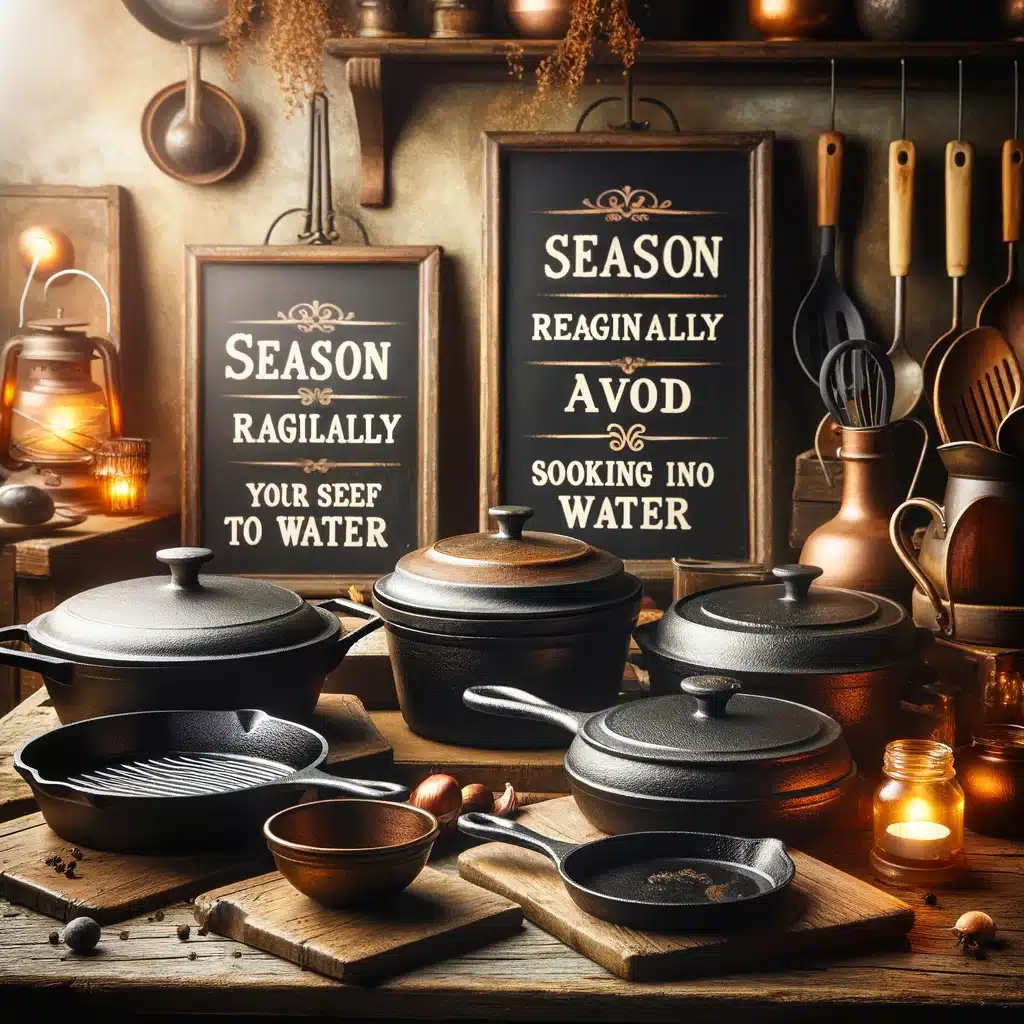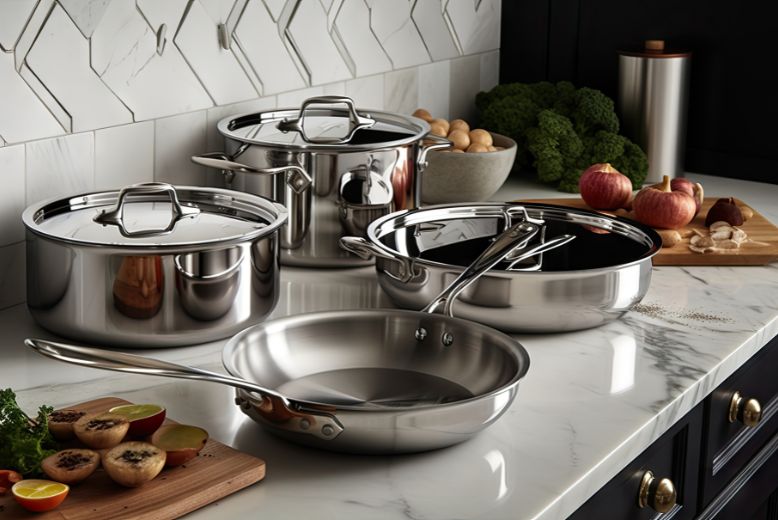Cookware Maintenance Tips are essential for ensuring your kitchen tools stay functional, durable, and safe for cooking.
In this blog, we’ll share essential cookware maintenance tips to help you get the most out of your pots and pans. Cookware is an investment in your kitchen. Whether it’s non-stick, stainless steel, or cast iron, each type requires specific care to maintain its quality.
Proper cleaning, storage, and handling can prevent damage and enhance performance. By following simple maintenance tips, you can ensure your cookware stays in excellent condition for years. This guide will provide you with easy-to-follow advice, making your cooking experience better and your cookware last longer. Ready to take care of your kitchen tools like a pro? Let’s dive in!
Importance Of Cookware Maintenance
Proper care can make your cookware last longer. Cleaning after each use helps prevent damage. Use soft sponges to avoid scratches. Drying thoroughly stops rust. Store cookware in a dry place. Avoid stacking heavy items on top.
Well-maintained cookware works better. Food cooks evenly. Non-stick surfaces stay non-stick. Less oil is needed. Handles remain secure. Your food tastes better. No burnt spots. No sticking. Enjoy cooking more.

Credit: hestanculinary.com
Cleaning Basics
Keep cookware in top condition with regular cleaning. Use mild soap and warm water to avoid damage. Dry thoroughly to prevent rust.
Daily Cleaning
Rinse cookware right after use. Use warm water and mild soap. Avoid harsh scrubbing tools. Soft sponges work best. Dry with a soft cloth. Store properly to avoid damage.
Deep Cleaning
Soak cookware in warm soapy water. Use a paste of baking soda and water for tough stains. Gently scrub with a soft brush. Rinse thoroughly. Dry completely before storing.
Handling Nonstick Cookware
Metal utensils can scratch nonstick surfaces. Use plastic, wood, or silicone instead. These materials are gentle and safe. They help keep the nonstick coating intact. This makes your cookware last longer. Be gentle while cooking. Avoid cutting food directly in the pan. This prevents damage to the nonstick surface.
Stacking pans can scratch the coating. Use pan protectors or towels between them. This keeps the nonstick surface smooth. Store lids separately to avoid scratches. Hanging your pans is a good option. It saves space and keeps them safe. Always make sure pans are dry before storing. This prevents rust and damage.
Care For Stainless Steel
Stainless steel can stain. Keep it dry. Water spots can form. Use a soft cloth. Wipe after washing. Avoid harsh cleaners. These can scratch the surface. Vinegar helps with spots. Mix water and vinegar. Wipe the surface. Rinse well. Dry with a soft towel. Baking soda can help too. Make a paste. Apply gently. Rinse and dry. Your cookware will shine.
Polish to keep the shine. Use a stainless steel cleaner. Apply with a soft cloth. Rub gently. Follow the grain. Rinse with water. Dry well. Olive oil can also help. Apply a small amount. Buff with a cloth. Your stainless steel will look new.
Seasoning Cast Iron
Start by washing your cast iron with warm water. Dry it completely. Apply a thin layer of vegetable oil. Use a paper towel to spread the oil. Make sure the oil covers all surfaces. Place the pan upside down in the oven. Use foil to catch drips. Bake at 375°F for one hour. Let it cool in the oven. Repeat if needed.
Always clean your cast iron after use. Avoid soap; it removes seasoning. Use a scrub brush for stuck food. Dry the pan right away. Apply a thin layer of oil. Store in a dry place. Keep it rust-free. Avoid soaking in water. Regular care keeps your cast iron ready to use.

Credit: www.ikea.com
Dealing With Burnt-on Residue
Fill the pan with warm water. Add a few drops of dish soap. Let it soak for 15 minutes. This helps loosen the residue. For tough spots, mix baking soda with water. Create a paste and apply it. Let it sit for 10 minutes. Rinse thoroughly after soaking.
Use a non-abrasive sponge. Scrub gently in circular motions. This prevents scratches. For stubborn residue, use a nylon brush. Avoid using metal scouring pads. They can damage the cookware. For non-stick pans, use only soft sponges. Scrubbing hard can remove the coating. Rinse well after scrubbing.
Proper Storage Solutions
Keep your cabinets neat. Sort cookware by type. Stack pots and pans. Place lids together. Use drawer dividers. Keep small items sorted. This helps you find things quickly. Less mess means less stress.
Use felt or foam protectors. Protectors prevent scratches. Place them between stacked items. This keeps surfaces smooth. Your cookware will last longer. Clean protectors regularly. They can collect dust.

Credit: toxicityfacts.com
Avoiding Common Mistakes
Properly maintaining cookware ensures longevity and performance. Avoid using metal utensils on non-stick surfaces to prevent scratches. Always hand wash cast iron to maintain its seasoning.
Overheating Pans
Overheating pans can damage them. High heat can cause warping. Warped pans don’t sit flat on the stove. This leads to uneven cooking. Nonstick coatings can also get ruined. Use medium to low heat instead. This will keep your pans in good shape.
Using Abrasive Cleaners
Abrasive cleaners can scratch your pans. Steel wool and harsh scrubs are too rough. They remove the protective coating. This makes pans wear out faster. Use a soft sponge or cloth. Mild soap and water work best. This keeps your pans looking new.
Frequently Asked Questions
How Often Should I Clean My Cookware?
It’s best to clean your cookware after every use. Regular cleaning prevents food build-up and extends the life of your pots and pans.
What Is The Best Way To Clean Non-stick Pans?
Use a soft sponge and mild detergent to clean non-stick pans. Avoid abrasive scrubbers which can damage the non-stick coating.
Can I Put My Cookware In The Dishwasher?
Check the manufacturer’s instructions. Many cookware types are dishwasher-safe, but hand washing often helps maintain quality longer.
How Do I Remove Burnt Food From Pots?
Soak the pot in warm, soapy water for a few hours. Then gently scrub with a non-abrasive sponge.
Conclusion
Proper cookware maintenance extends their life and improves cooking results. Always clean promptly after use. Use gentle cleaning tools. Store cookware properly to avoid scratches. Regularly inspect for damage. Follow manufacturer guidelines for best care. These simple steps ensure your cookware stays in top condition.
Happy cooking with well-maintained tools!
